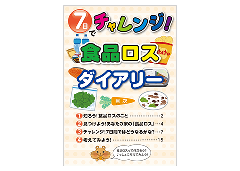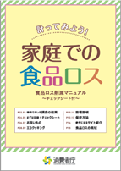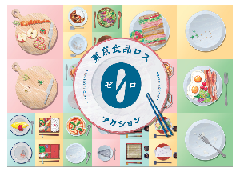Let's reduce food loss (food waste)!
What is food loss (food waste)?
Food Loss (Food Waste) refers to food that is still edible but is discarded as garbage.
In Japan, about 60% of food relies on imports from overseas, but approximately 6.12 million tons (Ministry of the Environment: Estimated value for 2017) of food is discarded each year, with about 2.84 million tons coming from general households and the remaining approximately 3.28 million tons generated by Business Operators.
Regarding food loss, one of the targets set forth in the "2030 Agenda for Sustainable Development" adopted by the United Nations in September 2015 is to halve per capita global food waste by 2030. In our country, a goal has been established to "reduce food loss from households by 50% compared to the year 2000 by 2030".
"Let's reconsider 'mottainai' with food" and practice efforts to reduce food loss!

Main Initiatives for Reducing Food Loss
About half of food loss occurs from households.
The main causes are the following three points.
- Direct Disposal: Disposed of as is after the expiration date or best before date has passed.
- Leftovers: Discarded because they could not be finished.
- Excess Removal: Parts that could be eaten were discarded during cooking.
Reducing food waste is beneficial not only for the environment but also for household finances.
Let's take this opportunity to put it into practice!
1 Let's correctly understand the deadline display!
When buying food, we tend to choose items with a long shelf life, but how about selecting those with a shorter shelf life if you plan to use them up quickly?
Expiration Date
The term 'expiration date for safe consumption' is often displayed on food products that can be stored for a long time.
Just because the expiration date has passed doesn't mean it can't be eaten right away.
For food that has passed this point, let's make individual judgments based on appearance, smell, and other factors.
Expiration Date
The concept of 'safe to eat by date.'
Foods that deteriorate in quality quickly are often labeled.
It is safer not to eat anything past this point.
2 Let's be mindful of "not buying too much," "not making too much," and "finishing what we eat!"
Buying too many ingredients during sales or forgetting to check the refrigerator and buying the same ingredients can lead to waste as you may not be able to use all the ingredients.
Let's check the inventory of food items such as refrigerators and shelves before going shopping.
In addition, by only preparing the amount of food that can be eaten, using vegetable peels and cores in cooking, and not peeling too thickly, food waste can be reduced with a few simple tricks.
In addition, we will provide content that allows you to investigate food loss occurring at home, including the "Food Loss Diary" created by the Ministry of the Environment and the Consumer Affairs Agency, and the "Tokyo Food Loss Zero Action" created by Tokyo. Please make use of these resources.
For more details, please visit the websites of the Consumer Affairs Agency and Tokyo Metropolitan Government below.



-
7-Day Challenge! Food Loss Diary (PDF 11.5MB)

-
Let's Measure! Food Loss at Home (PDF 3.4MB)

-
Tokyo Food Loss Zero Action (PDF 4.5MB)

-
Take Action to Reduce Food Loss (Consumer Affairs Agency)(External Link)

3 Let's make use of food drives!
This is a volunteer activity where surplus food from homes and businesses is collected and donated to welfare organizations and facilities.
For more details, please see the page below.
The Ministry of Agriculture, Forestry and Fisheries is promoting the donation of unused food to food banks from the perspective of reducing food loss and alleviating the burden of waste disposal. We are collecting information on unused food that food-related Business Operators wish to donate to food banks and are implementing an initiative to disseminate this information simultaneously to food banks across the country.
If you are having trouble disposing of unused food, please refer to the following website of the Ministry of Agriculture, Forestry and Fisheries.
Let's practice the 3010 (Sanmaruichimaru) movement!
"3010 (Sanmaruichimaru) Movement" is a campaign aimed at reducing food waste by encouraging diners at restaurants to eat at their own seats for the first 30 minutes and the last 10 minutes of their meals during banquets and gatherings.
In addition, the Consumer Affairs Agency, the Ministry of Agriculture, Forestry and Fisheries, and the Ministry of the Environment have created a "Delicious 'Finish Your Meal' Guide for Dining Out", and we would like to inform you as follows.
Please make use of it.
Reference
-
Food Loss Portal Site(External Link)

-
National Movement to Reduce Food Loss (NO-FOODLOSS PROJECT)(External Link)

-
Let's Eliminate Food Waste Project(External Link)


To view the PDF file, you need "Adobe(R) Reader(R)". If you do not have it, please download it for free from Adobe website (new window).
Please let us know your feedback on how to make our website better.
Inquiries about this page
Inagi City, Department of Urban Environment and Development, Living Environment Division
2111 Higashi-Naganuma, Inagi City, Tokyo 206-8601
Phone number: 042-378-2111 Fax number: 042-377-4781
Contact the Living Environment Division, Urban Environment Management Department, Inagi City



















